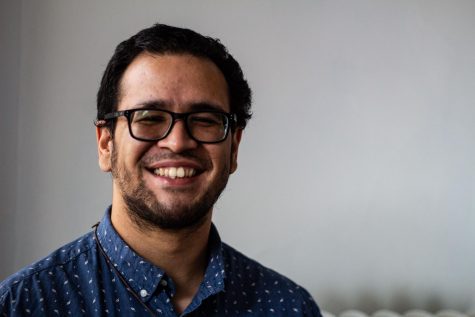NEIU Board of Trustees Members Doubt Commitment, Competence of Students
Comments by Stein and Serrano aired during an Oct. 24 Board of Trustees meeting
November 15, 2022
NEIU Board of Trustees member Jonathan Stein criticized NEIU students saying that they have a “dual responsibility” in the decline of enrollment at school because students drop out due to a lack of academic level and commitment.
The comments flared out as Board member Charles Serrano was discussing a recommendation for a 2.5 percent tuition increase for new students and those not protected by NEIU admission programs during an Oct. 24 Finance, Buildings and Grounds Committee meeting.
The Board of Trustees at NEIU operates, manages, controls and maintains the university since it was established in 1996 by the State of Illinois. Stein and Serrano have been board members since 2011 and since 2019 respectively.
After trustee Serrano expressed his frustration for the low rate of student retention that NEIU had with the NEIU One program, 43 percent of students allegedly dropped out, he said he did not understand why the school is not retaining students and that in those circumstances he could not consider a tuition rise.
Stein interjected and said, “Are they truly prepared for college-level work? Maybe they should have gone to a community college first. Do they have financial responsibilities with family etc.? Our students tend to be older, we are not the classic [school with] 18 to 22-year-old students [with] parents paying for they’ve got to do their own education. Are they fully committed to do the work? You know, there’s a dual responsibility. Yes, Northeastern has a responsibility but there’s a dual responsibility here with the students.”
Serrano added immediately to Stein’s comment, saying “If we’re just recruiting for the sake of recruit[ing] anyone that really and we convince them because they need or we convince them they should want to go to college. It’s our problem that we’re not testing them, briefing them by doing what you’re just saying.”
A climate study ordered by Gibson’s administration in Spring 2020 found that students consider leaving NEIU because of a “lack of a sense of belonging, affordability, lack of class options, and lack of support services and resources for students.”
Edwin Medina, NEIU’s Student Government Association president, said regarding the comments, “Students at NEIU do not drop out due to a lack of academic preparation. They leave because we lack the means to bring them where they need to be.”
City Colleges of Chicago Truman College, for example, has a sprawling writing and reading center that freshmen and communications students must visit as a requirement to successfully submit assignments for English classes. Students do not have those kinds of systems of support at NEIU.
Overall, Latinos and African Americans, which compose 47.9 percent of NEIU’s student body for Fall 2022, have a graduation rate of less than 30 percent per the Pew Research Center.
Roughly half of Latinos and African Americans said to Pew Research Center that they could not afford to go to college because they need to work to support their families.
The NEIU’s climate study reported that 53 percent of NEIU students manifested financial hardships with 74 percent of them saying that they were struggling to pay for school.
At some moment after trustees Serrano and Stein spoke, President Gibson said to the committee: “The majority of our students come from high schools that are the least funded in the city. Those are the students that we serve, and that I as President proudly serve, do we need to do a better job with retention? You are absolutely right, we do.” Then she added, “this is also an equity issue as well. Because when we look at those students who we are losing, they are black and brown students, right? And it is not always because of the classes that they take, the professors that they have, the experience that they have at NEIU, our students have many challenges, they have many challenges.”
Medina added that the comments by these board of trustees members show the disconnection between the board members and the NEIU student population, he said, “I want every board member to consider what they have done to engage with students” because “you cannot connect to students by reading a report or attending a meeting.”










